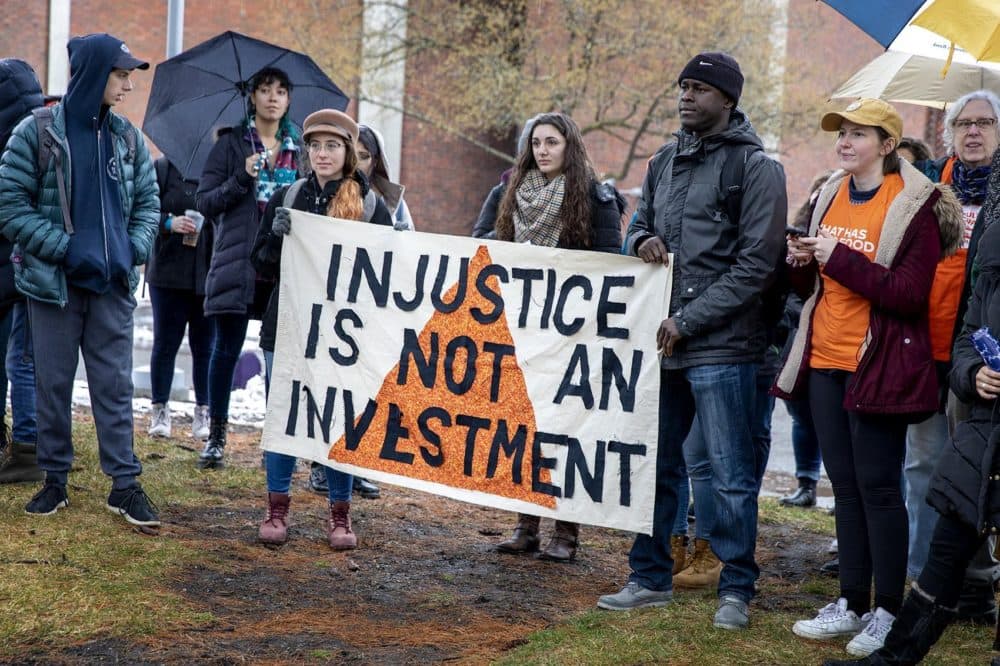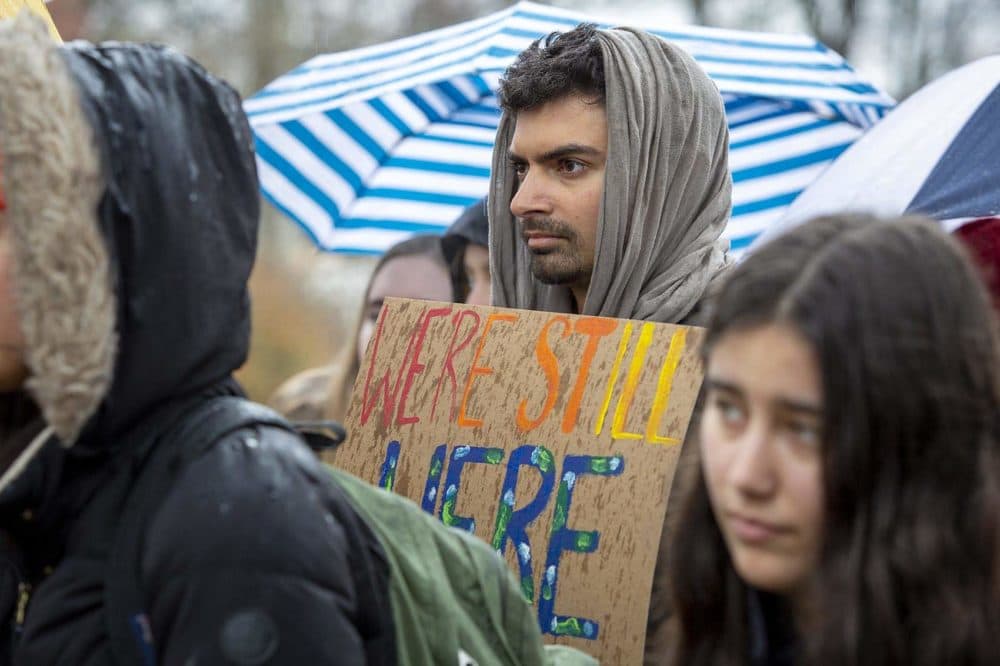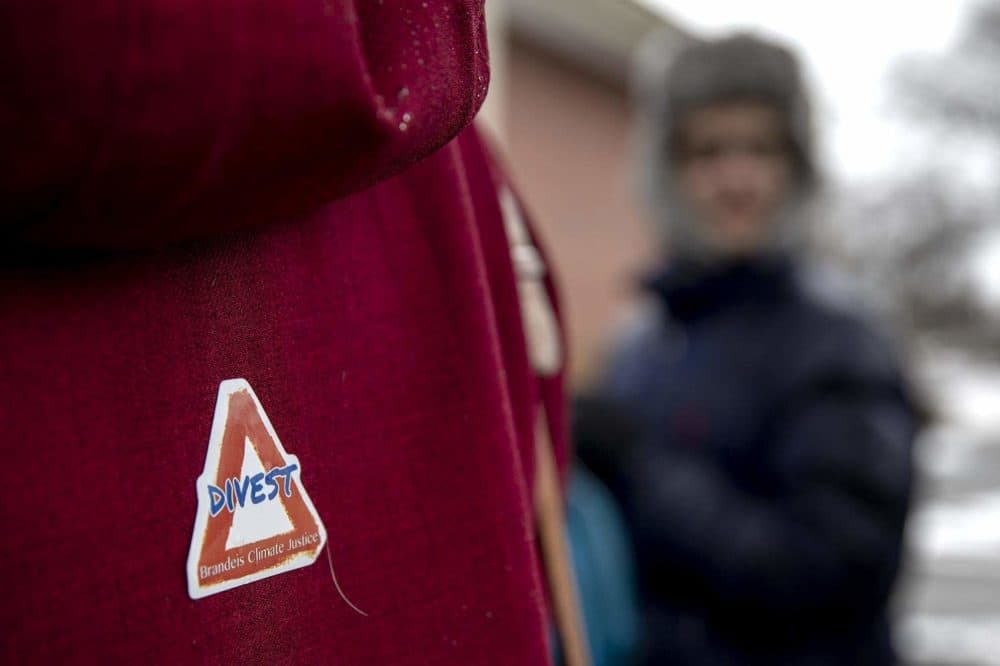Advertisement
Students Call For Mass. Colleges To Divest From Fossil Fuel Companies In National Protest

While a cold rain fell, turning what snow was left on the ground into slush, a group of about 60 Brandeis University students and faculty on Thursday demanded the school divest from fossil fuel companies as a way to address climate change.
Rallying in the school's "peace garden" outside the college's Usdan Student Center, the protesters said Brandeis should reinvest its money in socially responsible and environmentally sustainable places, and provide greater transparency about its $1 billion portfolio.
"It is unacceptable that we are still directly profiting off of these immoral and destructive industries," said Sydney Carim with Brandeis Climate Justice. "And it upsetting that we don't even know how much of our endowment is invested in fossil fuels."
The gathering at Brandeis was part Fossil Fuel Divestment Day, a national day of action to push colleges and universities divest from oil, gas and coal companies.
"This is an issue that we feel is critical to stopping the climate crisis," Carim said. "If we are going to make changes that are actually going to have an effect on the crisis that is coming our way, then we need to stop supporting and profiting off of the fossil fuel industry."
Around the country, students at more than 50 colleges and universities registered to participate in the day of action.
"What makes today so unique is that we are joining schools all around the country to call for divestment in a really organized way that we haven't really seen before," said Caleb Schwartz, one of the leaders of the Harvard University divestment movement.
"This kind of mass coordination, not just at universities but between universities, is really something that can be impactful and send a really clear message to university administrators that we're not just one group of students at one college asking for divestment, but really the voices of students around the world fighting for our future," he said.
In Massachusetts, a variety of actions were planned at about a dozen schools. At Mt. Holyoke College, about 300 students walked out of class; at MIT, students put up a big banner and distributed educational materials; and at Harvard University, students occupied an administrative building.
Advertisement
Given the state's longstanding reputation as a leader in higher education, student activists say, universities here have an extra responsibility to lead the call for divestment.
"MIT has a chance to make a real important impact, and if they divest, not only will it be their money that's taken out of fossil fuel companies, but this could be a domino that leads to many other universities taking the same action," said Trevor Spreadbury of the student group MIT Divest.
According to both universities, MIT's endowment is about $17.4 billion; Harvard's endowment — the largest in the country — is calculated to be about $39 billion.
In an email, Brandeis media relations Director Julie Jette said that the university has already taken actions to limit its investments in fossil fuels.
"The university has sought to balance the needs of funding financial aid, faculty salaries, and other core educational programs from its endowment with concerns about investments in fossil fuel. Letting our investments in fossil fuel private limited partnerships run off at the end of their life cycles, and suspending new investments in such vehicles, was the balance that Brandeis struck," she wrote.
But for students at Brandeis, this commitment isn't enough.
"If Brandeis is going to be a unique institution based on social justice, then it needs to be held accountable to that standard," PhD student Aneil Tripathy said. "If our goal is social justice, that has to be what is making this university unique. And it can't just be on a flyer to recruit students; it needs to be taken seriously."

The fossil fuel divestment movement has been around for about a decade, but has gained steam in recent years, said Alyssa Lee of Divest Ed, the Cambridge-based nonprofit group helping to organize Thursday's actions.
"We have an enormous opportunity as students to really shape our institutions to make a very powerful political statement about, not just climate change, but specifically the fossil fuel industry. And divestment is one of the most powerful statements they can make," she said.
Earlier this month, Georgetown University announced it would "[freeze] new endowment investments in companies or funds whose primary business is the exploration or extraction of fossil fuels, divest from public securities of fossil fuel companies within the next five years and divest from existing private investments in those companies over the next 10 years."
And last week, the Faculty of Arts and Sciences at Harvard University voted overwhelmingly to tell the Harvard Corporation — the school's highest government body — to direct the Harvard Management Company to divest from fossil fuels.
"Divest Harvard has been going on as a campaign for eight years and we are really seeing an extreme escalation in pressure from Harvard students, faculty and alumni," said Schwartz, of Divest Harvard.
In November, students from the divestment movements at Harvard and Yale University disrupted the annual Harvard-Yale football game.

This article was originally published on February 13, 2020.
